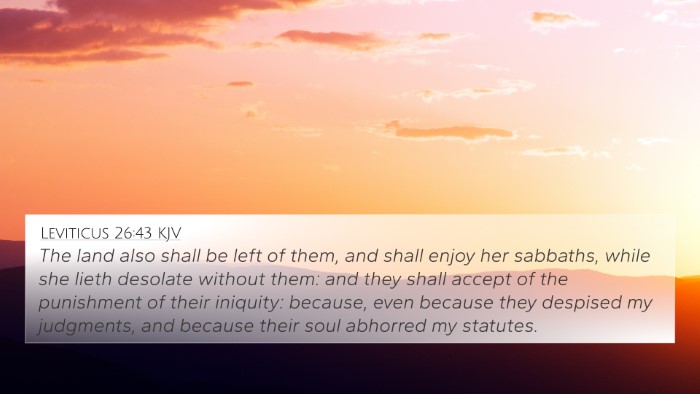Understanding Numbers 15:31
Verse Reference: Numbers 15:31 states, "Because he has despised the word of the LORD, and has broken his commandment, that soul shall be utterly cut off; his iniquity shall be upon him."
This verse carries significant weight in the context of Biblical law and the consequences of sin against God’s commandments. To fully grasp its meaning, we draw insights from various public domain commentaries.
Commentary Insights
Matthew Henry's Commentary
Matthew Henry highlights that the essence of this verse lies in the severe consequences faced by those who disregard the commandments of the Lord. He emphasizes the importance of obedience, illustrating that a disregard for God’s word leads to a separation from God’s favor. He mentions that the phrase "utterly cut off" signifies not just physical punishment but a spiritual separation from the community of believers and from God Himself.
Albert Barnes' Commentary
Albert Barnes explains that the term "despised" indicates a conscious choice to reject God's laws. He notes the gravity of this rejection, which reflects an attitude of contempt and lack of reverence towards God's authority. The punishment mentioned implies that such actions carry immense repercussions that can affect not just the individual but also the community at large. Barnes connects this idea to the broader theme of divine justice as it relates to obedience and disobedience.
Adam Clarke's Commentary
Adam Clarke interprets this verse by stressing the theological implications of breaking God’s commandments. He discusses how this act of rebellion is equivalent to embracing sin, and that divine justice demands accountability for such choices. Clarke further elaborates on the necessity for the community to uphold God’s laws to maintain spiritual integrity and communal harmony. He connects these thoughts to instances in both the Old and New Testaments where God's judgment is demonstrated towards disobedience.
Bible Verse Cross-References
- Leviticus 20:3: Discusses the consequences of turning to idols and the resulting severing from community.
- Deuteronomy 17:12: Highlights the requirement of obeying decisions made by the priest and the dire consequences of disobedience.
- Hebrews 10:28: Relates to the punishment under the Mosaic law for rejecting God, emphasizing the seriousness of transgression.
- 1 John 2:4: States that those who claim to know God but do not keep His commandments are liars.
- Jeremiah 6:19: Speaks of the consequences of not heeding God’s laws and the resultant judgment that follows.
- Romans 6:23: Affirms that the wages of sin is death, connecting the theme of divine justice with Numbers 15:31.
- James 2:10: Points out the gravity of breaking even one commandment and the totality of the law’s accountability.
- Matthew 7:23: Reflects on those who claim to know Christ but do not obey His commands, leading to rejection by Christ.
- Galatians 5:19-21: Lists the fruits of a life led by the flesh and warns of the consequences of such a lifestyle.
- Mark 3:29: Discusses the sin against the Holy Spirit and its unforgivable nature, echoing the themes of grave sin found in Numbers 15:31.
Inter-Biblical Dialogue
Numbers 15:31 opens a dialogue with various texts throughout the Bible that reflect on the attitude towards God’s commandments. The implications of despising God's word resonate through both the Old and New Testaments, reinforcing an ongoing theme of divine justice and the condition of the heart.
Thematic Bible Verse Connections
This verse underscores several key themes, including:
- Obedience vs. Disobedience: As seen in texts like Deuteronomy 28.
- Judgment and Accountability: Illustrated in the parables of Jesus where judgment is passed for unfaithfulness.
- The Nature of God’s Law: Reflected in Psalm 119 and its celebration of the law as a guide for life.
Tools for Bible Cross-Referencing
Studying the connections between scriptures is essential for a deeper understanding of the biblical narrative. Utilizing tools such as a Bible concordance, Bible reference resources, and a Bible cross-reference guide can significantly enrich your study and understanding of verses like Numbers 15:31.
Conclusion
Numbers 15:31 serves as a powerful reminder of the seriousness with which we should regard the commandments of God. By understanding this verse in conjunction with other cross-referenced scriptures, believers can foster a more profound respect for scriptural instruction and the nature of God’s justice.
















